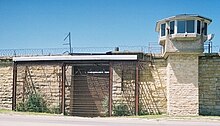Joliet Correctional Center

East gate of the prison. (The Joliet Jake Gate from The Blues Brothers).
|
|
| Location | Joliet, Illinois |
|---|---|
| Coordinates | 41°32′49″N 88°04′27″W / 41.54694°N 88.07417°WCoordinates: 41°32′49″N 88°04′27″W / 41.54694°N 88.07417°W |
| Status | Closed in 2002 |
| Opened | 1858 |
Joliet Correctional Center (originally known as Illinois State Penitentiary, colloquially as Joliet Prison, Joliet Penitentiary and the Collins Street Prison) was a prison in Joliet, Illinois, America from 1858 to 2002. It is featured in the motion picture The Blues Brothers as the prison from which Jake Blues is released at the beginning of the movie. It is also the location for the first season of Fox Network's Prison Break television show and the movie Let's Go to Prison.
Joliet Correctional Center, which was a completely separate prison from Stateville Correctional Center in nearby Crest Hill, opened in 1858. The prison was built with convict labor leased by the state to contractor Lorenzo P. Sanger and warden Samuel K. Casey. The limestone used to build the prison was quarried on the site. . The first 33 inmates arrived from Alton in May 1858 to begin construction; the last prisoners were transferred in July 1860. Both criminals and prisoners of war were confined there during the Civil War. The first corrections officer to be killed there was Joseph Clark in 1865. By 1872 the population had reached 1,239, a record number for a single prison. From the 1870s the prison had work contracts with local businesses.
The prison was slow to modernize. There was no running water or toilets in the cells in 1910. The construction of the nearby Stateville Correctional Center began in 1917 and opened in March 1925 was meant to lead to the swift closure of Joliet. This did not happen, and both prisons operated simultaneously for the rest of the 20th Century.
A women's prison was added across the road from the main structures in 1896 but closed in 1932 when the female prison in Dwight, Illinois was opened. It then became an annex for the male prison and later the male reception unit for northern Illinois.
In 1924, Nathan Leopold and Richard Loeb were given life sentences to be served at Joliet (after their successful defense—from the death penalty—by Clarence Darrow). Their case was known as "the crime of the century" at the time after kidnapping and murdering Robert Franks.
...
Wikipedia
